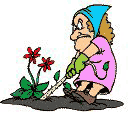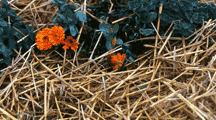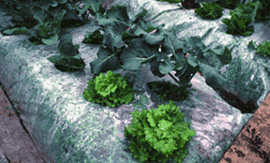
The Art of Weeding: Part 1
A year-round strategy for organic weed control
By Marion Owen, Fearless Weeder
for PlanTea, Inc. and
Co-author of Chicken Soup for the Gardener's Soul
FEATURE ARTICLE:

Tom Hanks' "Power of Four" solution
More good stuff:
Who is Marion Owen?
FAQs about PlanTea
Search Marion's articles, tips and recipes
Why grow organic?
News and press releases
Read love letters
How to link to this site
Need a speaker?
How to contact Marion
Visiting Alaska?
Come to Kodiak Island!
Go to home page

Marion's UpBeet Gardener
Newsletter has been
replaced by Marion's blog
which you can find at:
www.marionowen.wordpress.com
 "No
garden is without its weeds," said Dr. Thomas Fuller. Yet weeds probably
discourage more gardeners than any other problem--including slugs. A summer
doesn't go by where I don't hear, "Oh, the garden was overgrown with weeds
so we finally gave up."
"No
garden is without its weeds," said Dr. Thomas Fuller. Yet weeds probably
discourage more gardeners than any other problem--including slugs. A summer
doesn't go by where I don't hear, "Oh, the garden was overgrown with weeds
so we finally gave up."

This is a common complaint of many gardeners, but it doesn't have to
be that way. I mean, have you ever heard someone say, "Oh, the living
room finally got so dusty that we just stopped using it"? Well, we don't
stop enjoying the living room because of dust. We simply vacuum or sweep
occasionally to keep the room clean. The same holds true for your garden:
Regularly cleaning is one of the keys to a successful garden, and weeding
plays a big role.
Weeds: Good news, bad news
 Weeds
rob valuable nutrients from the soil and compete with your hard-earned
herbs, flowers, shrubs and vegetables. And because they can shelter harmful
insects and diseases, it's important to eliminate weeds. Yet, not all
weeds are bad, as you'll see.
Weeds
rob valuable nutrients from the soil and compete with your hard-earned
herbs, flowers, shrubs and vegetables. And because they can shelter harmful
insects and diseases, it's important to eliminate weeds. Yet, not all
weeds are bad, as you'll see.
Finally, it's not just about winning the Weed War. Weeding might be considered a nasty chore, but it's a great way to really get to know what's going on in your garden. Plus, when it's done in the right frame of mind, weeding can be a pleasant, Zen-like, experience.
Here are some helpful tips to make life with weeds a little easier. In this article, we'll discuss how weeds impact your garden and how to stop their advance. In Part Two, we'll cover actual weeding techniques and strategies, tools, and the good side of weeds. For now, let's begin with:
The life of a weed
Just like flowers, weeds may be annuals, biennials or perennials. Annual weeds are the easiest to control. They complete their life cycles in a year or less. Summer annuals, such as crabgrass and lamb's quarters, sprout in the spring and go to seed in the fall. Winter annuals like chickweed sprout in the fall, over-winter and go to seed by spring or summer.
|
- - -
- - - - - - - - - - - - - - - - - |
Biennial weeds such as Queen-Anne's-lace, form roots and a rosette of leaves the first year and set seed the second. Perennial weeds live for more than 2 years. These are harder to control since they reproduce 4 ways: By seed, roots, stems and by stolons. Gardeners dread perennial weeds such as quackgrass and dandelions because they can spring back to life from an overlooked piece of stem or root. (For more about dandelions, see my article, Seven Ways to Get Rid of Dandelions--Without Chemicals).
A weedy population explosion
Did you know a single weed can produce as many as 250,000 seeds? It's a good news/bad news thing. Some seeds are viable for only a year while other can lie dormant for decades, just waiting for their chance to sprout. Buried more than several inches deep, the lack of light keeps them from germinating. But if you dig too deeply, as we'll discuss later, they'll germinate right along with your flower, herb and vegetable seeds.

Studies show that rototilling and
other deep tilling methods
do more harm than good by breaking down the soil structure and
bringing weed seeds to the surface to germinate.
Even if you're religious about hoeing and hand-pulling, more seeds arrive by air, by water runoff, and in bird droppings. You might accidentally introduce weeds by the Trojan Horse method: Tracking them in on your shoes, clothing, equipment or in the soil surrounding a plant purchased from a garden nursery.
Even lawn seed can be contaminated with weed seed. Buy only seed that is certified weed-free.
An ounce of prevention
Keeping weeds from getting started is easier than getting rid of them. Here's how:
- The first Rule of Thumb: Don't let weeds go to seed. Nature is not
only prolific, it abhors a vacuum. Thus, an empty patch of land won't
stay that way very long. Each weed plant can produce hundreds, even
thousands of seeds.
The old saying, "One year's seeding means seven years' weeding" holds true. And it adds up quickly. The more seeds you have, the more weeds you have. If weeds are removed from the garden and placed in the compost heap before they go to seed, their thousands of seeds won't be added to the garden. (Tip: Add them to the compost pile only if you keep the pile's temperature high, at least 140 to 160 degrees to kill the seeds. To learn about composting, visit my Compost Happens! article). As the years go by, fewer and fewer seeds will be left in the garden to germinate.
- Use weed-free mulches such as clean straw (plant stems minus the seedheads), pine bark or grass clippings.

If mulching with straw, use a clean
straw
(plant stems minus seedheads).
- In the spring, after preparing the soil for planting, let it set for
7 to 10 days. Then work the surface of the soil with a hoe. This will
slice off the newly emerged weed seedlings. If you have time before
planting, let the soil rest another week or so and hoe again.
- Cover the soil with black plastic to kill existing weeds and stop
seeds from germinating. Don't leave plastic in place for more than couple
months because soil needs air and water to remain healthy.
- Use vertical barriers, such as wood, metal or heavy-duty plastic edging between lawn and garden areas to prevent grass from sneaking in.

- Let the sun's heat weed your garden by solarizing the soil. Cover bare soil tightly with clear plastic for 2 to 4 weeks can kill weed seeds in the top few inches of the soil. Caution: In mild climates, using row covers and clear plastic can work against you. The photo below shows giant pillows of chickweed thriving under row covers in an Alaska garden. Oops.

- What's the best and way to beat weeds AND add valuable organic material
in the process? Mulching blocks weeds' access to light and air. A 3
to 4-inch layer of mulch applied between the rows in your garden, you
can slow down, or in many cases prevent the re-growth of weeds. Even
tough perennial weeds will eventually succumb to a thick layer of mulch.
Common mulch materials include:
- Bark
- Sawdust
- Wood chips
- Straw
- Newspapers -- Arrange on soil, cover with another mulch
- Grass clippings -- Avoid clippings treated with herbicides
- Black plastic -- Not attractive, but effective. Weight it down
- Don't add fresh (seed-filled) animal manure directly to the garden. Compost it first in a compost pile that reaches temperatures of at least 150 degrees F.
|
- - -
- - - - - - - - - - - - - - - - - |
Thanks for visiting and please stop by again. I'll put the coffee on!
Meet Marion Owen /// Learn about PlanTea /// Online Catalog /// Articles, Tips, Recipes /// Get free UpBeet Gardener newsletter /// Read current issue /// Listen to radio show /// Read news and press releases /// More resources and links /// Learn why 'grow organic?' /// View guidelines for retailers /// Read love letters /// Book Marion as a speaker /// Site map /// How to link to us /// Contact us /// Go to home page
PlanTea: The organic plant food in tea bags. http://www.plantea.com
Copyright ©1996 to present: PlanTea, Inc. All Rights Reserved. PO Box 1980, Kodiak, AK 99615-1980 USA
Questions or comments? marion@plantea.com Phone: Toll Free: 1-800-253-6331 (US and Canada); 907-486-2500